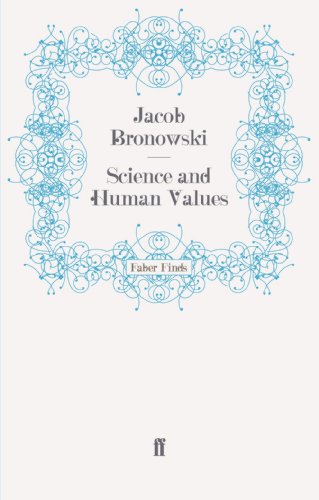Respect is a Scientific Virtue
The society of scientists must be a democracy.® It can keep alive and grow only by a constant tension between dissent and respect; between independence from the views of Others, and tolerance for them. The crux of the ethical problem is to fuse these, the private and the public needs. Tolerance alone is not enough; this is why the bland, kindly civilizations of the East, where to contradict is a personal affront, developed no strong science. And independence is not enough either: the sad history of genetics, still torn to¬ day by the quarrels of sixty years ago, shows that.*^ Every scientist has to learn the hard lesson, to respect the views of the next man—even when the next man is tactless enough to express them.
Tolerance among scientists cannot be based on indifference, it must be based on respect. Respect as a personal value implies, in any society, the public acknowledgements of justice and of due honor. These are values which to the layman seem most remote from any abstract study. Justice, honor, the respect of man for man: What, he asks, have these human values to do with science? The question is a foolish survival of those nineteenth-century quarrels which always came back to equate ethics with the Book of Genesis. If critics in the past had ever looked practically to see how a science develops, they would not have asked such a question. Science confronts the work of one man with that of without justice and honor anH rpsnprt bptwppn man and without justice and honor and respect between man and man. Only by these means can science pursue its steadfast object, to explore truth. If these values did not exist, then the society of scientists would have to invent them to make the practice of science possible. In societies where these values did not exist, science has had to create them.
Notes:
Mutual respect, building ideas on other ideas, is crucial to how science works.
Folksonomies: scientific virtue virtue science culture science virtue
Taxonomies:
/science (0.607821)
/society (0.249164)
/business and industrial/biomedical (0.239563)
Keywords:
Virtue Mutual respect (0.934540 (positive:0.770831)), honor anH rpsnprt (0.607932 (positive:0.700791)), nineteenth-century quarrels (0.373106 (negative:-0.519952)), science (0.371850 (positive:0.145089)), constant tension (0.369688 (positive:0.344055)), man (0.356125 (positive:0.580413)), sad history (0.339743 (negative:-0.769139)), human values (0.338394 (positive:0.272747)), ethical problem (0.333471 (negative:-0.483544)), strong science (0.322623 (negative:-0.424294)), public needs (0.322181 (negative:-0.357058)), foolish survival (0.319398 (negative:-0.519952)), hard lesson (0.319268 (neutral:0.000000)), personal affront (0.317562 (negative:-0.497118)), abstract study (0.314297 (positive:0.408931)), steadfast object (0.313420 (negative:-0.239714)), personal value (0.303444 (positive:0.565091)), public acknowledgements (0.302616 (positive:0.390886)), bptwppn man (0.288355 (positive:0.700791)), tolerance (0.271598 (negative:-0.559395)), justice (0.223655 (positive:0.553118))
Entities:
scientist:JobTitle (0.702799 (neutral:0.000000)), sixty years:Quantity (0.702799 (neutral:0.000000))
Concepts:
Virtue (0.953530): dbpedia | freebase | opencyc
Ethics (0.844858): dbpedia | freebase
Science (0.769018): dbpedia | freebase | opencyc
Sociology (0.680421): dbpedia | freebase | opencyc
Society (0.671750): dbpedia | freebase | opencyc
Morality (0.652055): dbpedia | freebase
Value (0.615330): dbpedia | freebase
Scientist (0.568436): dbpedia | freebase | opencyc






